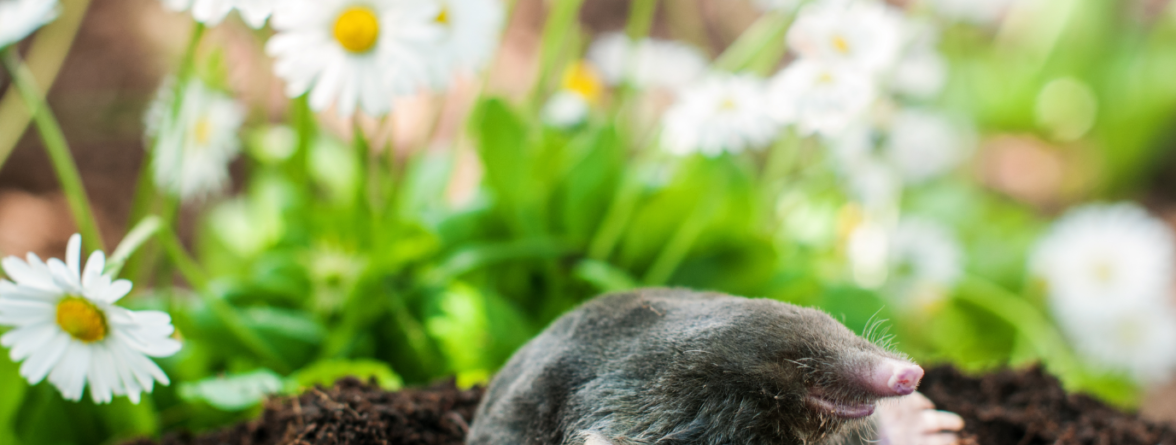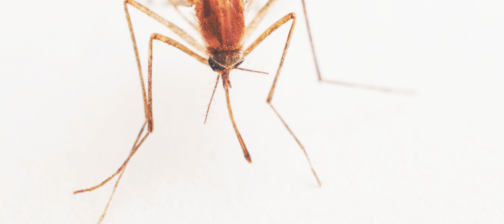We are no stranger to moles in the Lowcountry. They tunnel throughout our yards and cause damage and destruction along the way . This damage can be both unsightly and very costly. Your yard is not the only thing in danger when it comes to these nuisance pests. Albeit indirectly, they can also harm the root systems of garden plants. Springtime is when our focus shifts to spending more time outside, with gardening (floral and veggie) being a popular pastime. Nobody wants to see their hard work ruined by these pesky critters, so we have put together some tips and tricks to help you keep your garden safe from moles. Check them out below! But first … let’s talk about the good and the bad associated with moles.
What Good Are Moles?
If you have ever twisted your ankle on a mole tunnel while walking through your yard, then it may be hard to envision anything good about these creatures. But despite our feelings about these pests, moles do fit in with nature’s grand plan. Moles provide very valuable services when it comes to managing soil and sub-soils:
- Aeration: Their tunneling loosens soil which provides aeration.
- Improved soil quality: As tunneling continues, soil shifts and begins to blend the surface soil with deeper sub-soil. This improves overall soil quality.
- Diet: Moles are hearty eaters and consume numerous garden pest insects, grubs, and larvae that too put your garden at risk. They consume up to 100% of their body weight every day!
What Problems do Moles Cause?
The good never comes without the bad! There are 2 main problems moles can cause homeowners:
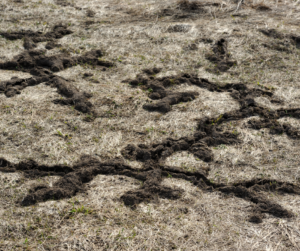
- Yard: Tunneling can wreak havoc on your lawn, causing unsightly ridges and damaging the root system of turf. This will cause the raised areas of grass to eventually dry out and die.
- Garden: This same tunneling may also uproot plants and flowers, causing extensive damage and ultimately death.
Moles have the ability to tunnel up to 100 feet in a single day. Because they actively feed day and night all year long, combined with their ability to quickly travel, if you suspect mole activity in your yard it is important to take action to control them immediately.
Tips + Tricks to Help Safeguard Your Garden From Moles
Now that you know a little more about the good and the bad associated with these nuisance pests provide, let’s talk about measures you can take to keep your garden safe from moles this spring and summer.
-
Recognizing Mole Activity in Your Garden
The 2 most common signs of mole activity in your garden are raised ridged areas and traditional molehills. Ridges are caused by tunneling just below the surface of the ground. In this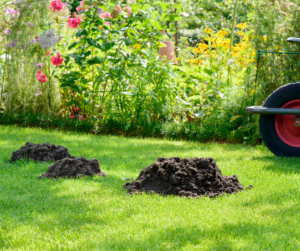 instance the pest is a complete nuisance and not providing any benefits to your soil. Alternatively, the cone-shaped molehills are formed by the dirt moles excavate as they dig deeper tunnels around their den and living chambers. With molehills, the soil will be aerated, and the quality of the soil will improve. At the same time, however, your garden will incur much more significant and sometimes irreparable damage.
instance the pest is a complete nuisance and not providing any benefits to your soil. Alternatively, the cone-shaped molehills are formed by the dirt moles excavate as they dig deeper tunnels around their den and living chambers. With molehills, the soil will be aerated, and the quality of the soil will improve. At the same time, however, your garden will incur much more significant and sometimes irreparable damage.
-
How to Control Moles in Your Garden
There are a few different methods to control and ride your garden and lawn of moles. Note: Methods that include killing moles by trapping or poison will not be addressed in this blog and are best researched somewhere else.
Barrier Methods to Control Moles: There are various barrier methods you can implement to keep moles at bay. They include trenching and using wire screen mesh.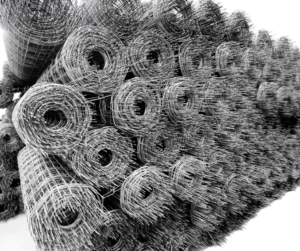
- Trenching: Digging a trench around your garden is an easy way to create a barrier against moles. This method is most practical in smaller vegetable gardens.
- Wire screen mesh: Lining a garden bed with hardware cloth is another easy way to create a barrier against moles. The barrier needs to be dug to a depth of 30 inches and must extend 5-6 inches above the ground. Unlike trenching, this method is very labor intensive and, if you have a small garden, also impractical.
Ultrasonic + Vibration Devices to Control Moles: These types of devices produce intermittent pulses that are intended to annoy moles and chase them off your property.
Chemical Treatments to Kill Grubs: Moles eat grubs, and grubs are generally considered garden pests. Ridding your garden of grubs may – you guessed it – also rid your garden of moles! We recommend using products that are environmentally safe to eliminate grubs to ensure no other plant or animal life will be negatively affected.
-
Maintain Good Gardening Practices
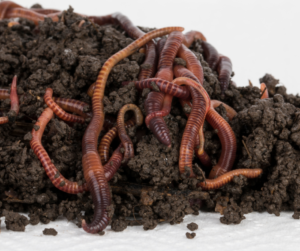 Moles will not survive long in areas without a habitat. They love compost piles and mulch because both are nutrient rich for these invasive pests. The pesky critters are insectivores and eat worms, and many composting techniques involve using worms to break down the materials. Moles are attracted to mulch beds for similar reasons, so swapping out crushed marble or pea gravel for bark chips is recommended.
Moles will not survive long in areas without a habitat. They love compost piles and mulch because both are nutrient rich for these invasive pests. The pesky critters are insectivores and eat worms, and many composting techniques involve using worms to break down the materials. Moles are attracted to mulch beds for similar reasons, so swapping out crushed marble or pea gravel for bark chips is recommended.
-
Use a Good, Effective + Natural Mole Repellent
Moles play a role in the natural food chain and killing them is never the recommended option. Introducing a natural repellent into your yard, such as the treatments we provide, works well and is persistent. At Imperial Pest Controllers, our team is trained and ready to handle your mole problem. We first perform a full inspection of your property to locate and flatter tunnels, then introduce a non-toxic mole repellent granule to all the grass areas. Two weeks later we return to your property and apply the same non-toxic repellent to areas outside of the grass, as well as to any new areas of activity. Four weeks following we begin maintenance treatment on all areas of your property, garden included.
-
Pray For Rain
April showers bring much more than May flowers! Spring rain can help keep mole populations in check. When this time of year rolls around, if your yard is susceptible to moles, then add regular rain showers to your wish list.

